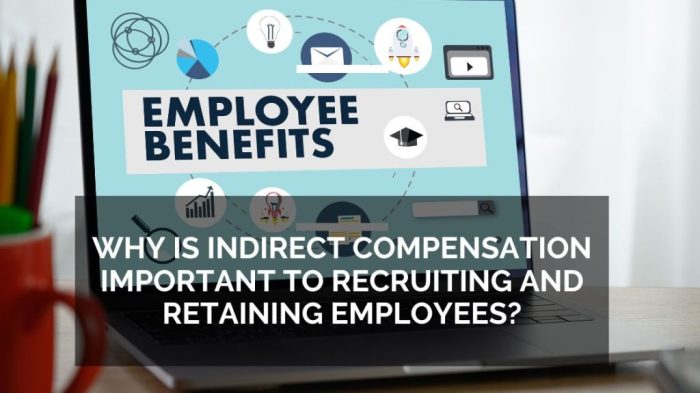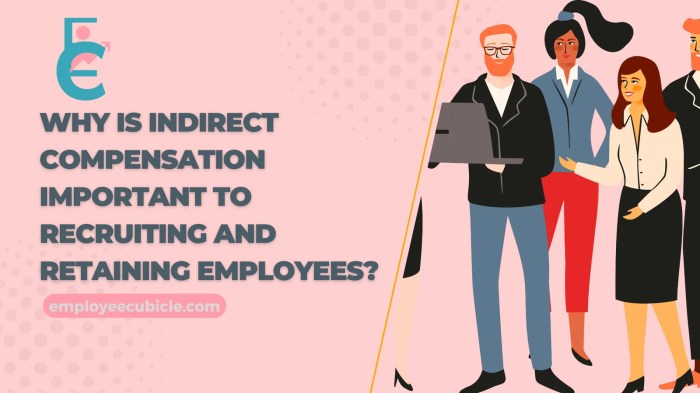Why is indirect compensation important to recruiting and retaining employees? This article delves into the crucial role of indirect compensation in attracting and retaining top talent, exploring its impact on employee value propositions and showcasing how companies leverage it successfully in their recruitment strategies.
Indirect compensation extends beyond monetary rewards, encompassing a range of benefits that enhance employee well-being, work-life balance, and professional growth. By understanding the significance of indirect compensation, organizations can create competitive compensation packages that not only attract but also retain a skilled and engaged workforce.
Define Indirect Compensation

Indirect compensation, also known as employee benefits, encompasses non-cash rewards and perks provided by employers to supplement direct compensation (salaries and wages). These benefits aim to enhance employee well-being, job satisfaction, and overall financial security.
Examples of indirect compensation include:
- Health insurance
- Paid time off
- Retirement plans (e.g., 401(k), pensions)
- Flexible work schedules
- Wellness programs
- Tuition reimbursement
Importance of Indirect Compensation in Recruiting
Indirect compensation plays a crucial role in attracting and retaining top talent. It demonstrates an employer’s commitment to employee well-being and creates a positive work environment. By offering a comprehensive benefits package, organizations can:
- Enhance their employee value proposition (EVP) and differentiate themselves in the competitive job market.
- Attract and retain highly skilled and experienced professionals.
- Improve employee morale, job satisfaction, and loyalty.
Companies that have successfully used indirect compensation in recruiting include:
- Google: Known for its generous benefits package, including unlimited paid time off, free meals, and comprehensive health coverage.
- Salesforce: Offers a range of benefits, such as flexible work schedules, paid parental leave, and a generous 401(k) matching program.
Types of Indirect Compensation

Indirect compensation can be categorized into different types based on its purpose and impact on employees:
Health and Wellness Benefits
- Health insurance
- Dental insurance
- Vision insurance
- Wellness programs
Work-Life Balance Benefits
- Paid time off
- Flexible work schedules
- Childcare assistance
- Eldercare assistance
Retirement Benefits, Why is indirect compensation important to recruiting and retaining employees
- 401(k) plans
- Pensions
- Profit-sharing plans
- Employee stock ownership plans (ESOPs)
Professional Development Benefits
- Tuition reimbursement
- Training programs
- Mentorship programs
- Career counseling
Designing an Effective Indirect Compensation Package

To design an effective indirect compensation package, employers should consider the following factors:
- Company culture and values
- Industry benchmarks
- Employee demographics and needs
- Budget constraints
It is important to align indirect compensation with company culture and values to ensure that the benefits package reflects the organization’s commitment to its employees. Additionally, employers should communicate the value of indirect compensation to employees to ensure that they understand and appreciate the benefits provided.
Measuring the Impact of Indirect Compensation
To assess the effectiveness of indirect compensation, organizations can measure key metrics, such as:
- Employee turnover rates
- Job satisfaction levels
- Absenteeism and presenteeism rates
- Employee engagement scores
By tracking these metrics over time, organizations can determine the impact of indirect compensation on employee recruitment, retention, and overall well-being.
Companies that have successfully measured the impact of indirect compensation include:
- Microsoft: Conducted a study that found that employees with access to comprehensive benefits packages had higher job satisfaction and lower turnover rates.
- IBM: Implemented a wellness program that resulted in reduced healthcare costs and improved employee productivity.
Indirect Compensation in the Future: Why Is Indirect Compensation Important To Recruiting And Retaining Employees
Indirect compensation is expected to continue to evolve in the future, driven by emerging trends such as:
- Increased focus on employee well-being and mental health
- Adoption of flexible work arrangements
- Greater emphasis on personalized benefits
- Use of technology to enhance benefits delivery
Organizations that embrace these trends will be better positioned to attract and retain top talent in the competitive job market of the future.
Questions Often Asked
What is indirect compensation?
Indirect compensation refers to non-cash benefits provided by employers to employees, such as health insurance, paid time off, and retirement plans.
How does indirect compensation contribute to employee recruitment?
Indirect compensation can enhance employee value propositions, making organizations more attractive to potential candidates.
What are the different types of indirect compensation?
Indirect compensation can include health and wellness benefits, work-life balance benefits, retirement benefits, and professional development benefits.
How can organizations measure the impact of indirect compensation?
Organizations can track metrics such as employee turnover rates and job satisfaction levels to assess the impact of indirect compensation.